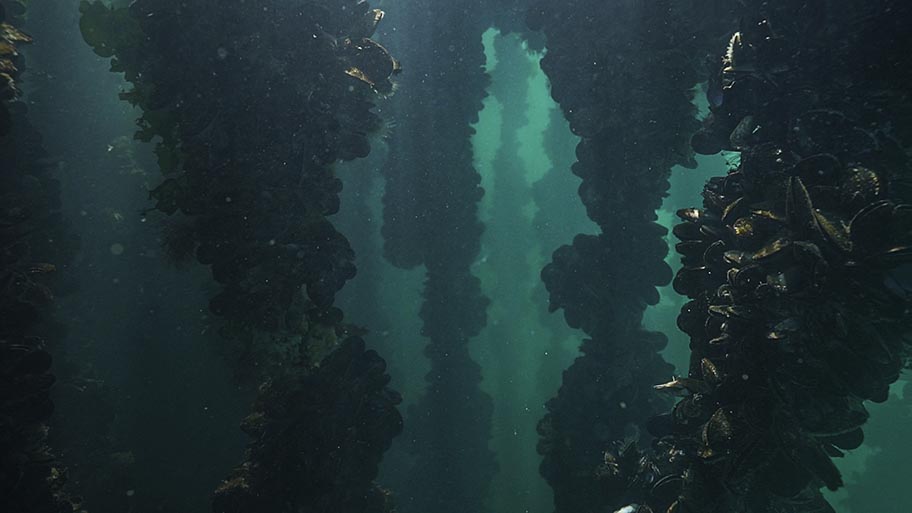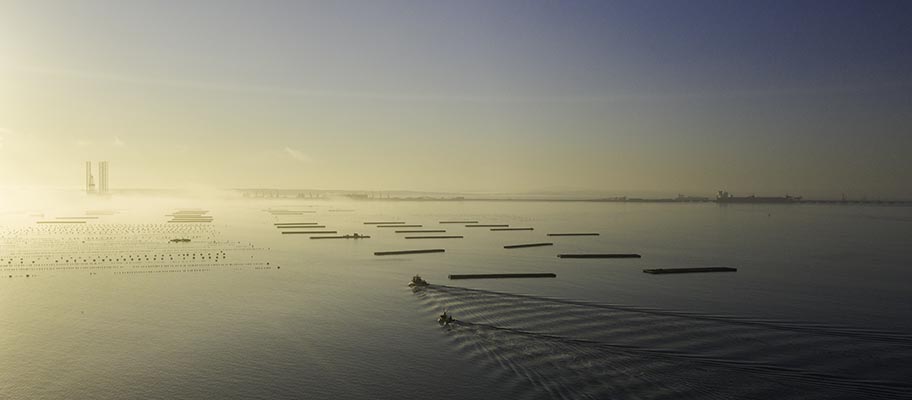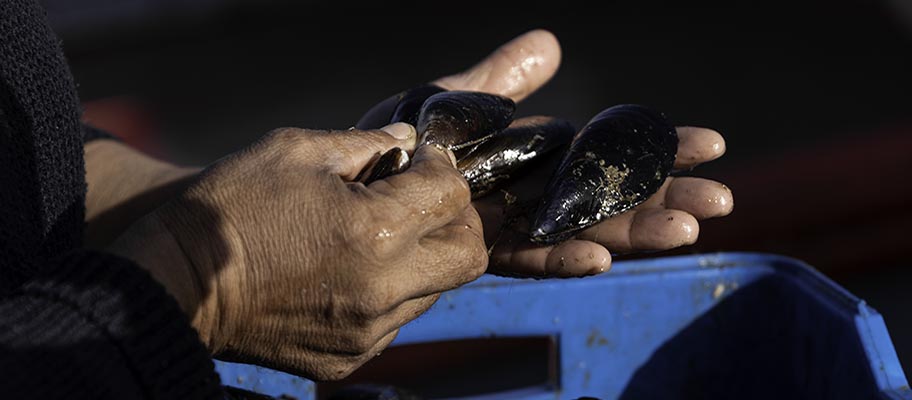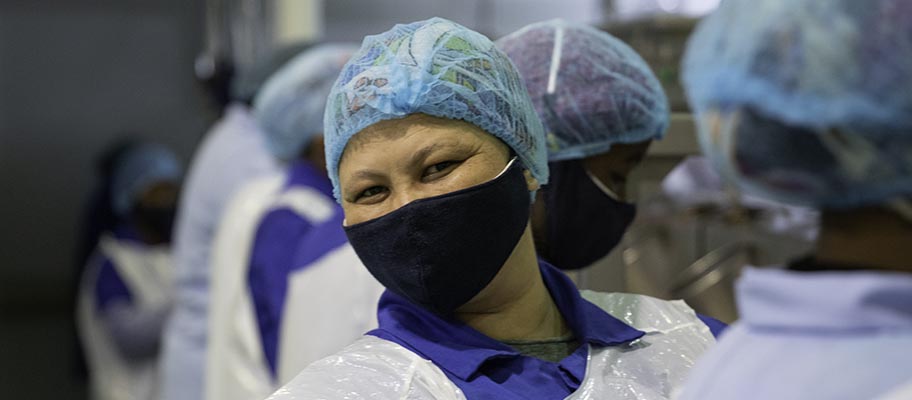Shock waves rippled through the local community when the ArcelorMittal Saldanha steel mill in South Africa was closed in 2020. Citing severe financial losses, the mill, situated approximately 100 kilometres north of Cape Town, had to close.
More than 1,000 jobs were lost and thousands more felt the impact indirectly. Already a challenged local economy due to Saldanha’s arid nature, only a small number of people live there and employment is sparse.
But underneath the water in the nearby bay, is a lifeline for these communities in the form of an unlikely hero: the mussel. Local harvesters take advantage of the nutrient rich conditions in Saldanha Bay by placing ropes into the water to provide surfaces for the mussels to grow.
Local harvesters take advantage of the nutrient rich conditions in Saldanha Bay by placing ropes into the water to provide surfaces for the mussels to grow.
The humble molluscs have the potential to go some way to mitigate the impact of the closure of the mill. But crucially, there is a desire to take a sustainable route to provide not only income but significant additional benefits since it can also support an array of ecosystem services, such as clean water and a safe habitat for young fish.
The mussel's new-found status is being driven by a combination of market forces, a CEO with an eye for expansion and a shared vision with the Marine Stewardship Council. Collectively, they have set what was largely a small local subsistence business onto a path towards sustainability and global sales so that mussels can be harvested for generations to come.
An unlikely marine hero
South Africa’s coast is rugged and exposed, but Saldanha Bay is one of the few that is naturally sheltered. The prevailing winds and upwellings provide nutrient rich water which pour an abundance of food for local marine life into the bay – perfect for growing mussels.
The mussel spat or larvae of the indigenous black mussel (Chloromytilus meridionalis) and the previously introduced Mediterranean mussel (Mytilus galloprovincialis) now naturally occur in the bay environment. The larvae typically settle on rocks but local harvesters take advantage of the nutrient rich conditions here by placing ropes into the water to provide surfaces for the mussels to grow. The ropes are suspended from a longline system or rafts out in the bay for many months, before being reeled in and harvested.
Though a small number of operators produce mussels for the domestic market, a new Chief Executive has a bigger vision. Atlantic Royal is one of two larger operators in the region alongside Blue Ocean Mussels who also employ a substantial workforce.
“The closure of the Saldanha Steel mill has left the local economy in dire straits” explains Benjamin Ward, Chief Executive of Atlantic Royal. “So, every job that can be created sustainably is worth a lot.”
Through transforming his own business to become more sustainable and productive, he believes it will allow mussel fishing to be scaled to a level which would help to alleviate some of the unemployment pressures the community faces.
“When I looked at places like Chile which are the biggest exporters of mussels into the EU, I realised the methods we were using were outdated. It was semi-subsistence levels and impossible to compete with global markets. So, we’ve moved to longlines as well as rafts, we’ve added more automation, mechanisation and most importantly expanded to employ more highly skilled people in the business.”
Ward adds:” An export focused business is exactly what our country needs, it creates foreign exchange and mussels are a fantastic product that are unique to the ecosystem of Saldanha.”
Cratton van Niekerk, Farm Manager for African Olive Trading, one of the smaller mussel operators has been working with mussels for over 20 years: “I want my children to have the opportunity to work with mussels. The great thing about mussels is you can harvest over and over again – as long as it’s done sustainably.”
 Working at daybreak. Small company vessels transport the harvesting crew, roughly 15-20 members, out into the bay to harvest mussels from rafts. In the background is the retired steel mill.
Working at daybreak. Small company vessels transport the harvesting crew, roughly 15-20 members, out into the bay to harvest mussels from rafts. In the background is the retired steel mill.
Progressing towards sustainability
Since 2018, the wider Saldanha Bay rope-grown mussel fishery has been part of an MSC Pathway Project called Fish for Good, supported by the Dutch Postcode Lottery. Pathway Projects help guide fisheries, in particular, small-scale and Global South fisheries, toward more sustainable fishing operations.
The Saldana Bay rope-grown mussel fishery consists of a number of small and larger operators which are making improvements as part of the project.
“When we started Fish for Good, the mussel fishery was chosen because of the interest that key companies had shown in improving their sustainability,” explains Andrew Gordon, Fisheries Outreach Manager for Southern Africa at MSC. “Our role is to help guide these fisheries on how to meet our scientific Standard to help ensure the bay is productive for years to come.”
As the Fish for Good implementing partner, WWF South Africa works with the fishery, providing them with guidance and support towards improving their fishing practices. Bokamoso Lebepe is the Fishery Improvement Project (FIP) Coordinator for WWF South Africa. Though wild mussel fisheries generally have minimal potential to impact the wider environment, fisheries which are assessed against the MSC Fisheries Standard must have the relevant data to provide evidence that: their stock is healthy, they are not creating any long-term impact on the wider ecosystem and they are effectively managed.
From a retailer’s perspective, Atlantic Royal’s Ward has seen the benefits of ecolabels to businesses. He is leading Atlantic Royal’s drive to become certified to the MSC’s global scientific Standard for sustainable fishing.
 Cratton explains the difference between the indigenous black mussel and the previously introduced Mediterranean mussel
Cratton explains the difference between the indigenous black mussel and the previously introduced Mediterranean mussel
Increasing collection and analysis of data
Lebepe and Gordon ensure the Fish for Good project collects the data required for effective management plans. The aim is to achieve an unconditional pass against the Standard, entering full assessment by June 2023 to achieve full certification.
“We’re aiming to improve the management strategies around interactions with endangered, threatened or protected species and any benthic habitat impacts” explains Lebepe. “Together with the Department of Environment, Forestry and Fisheries we’re collecting baseline information and putting monitoring systems in place to ensure all of the sites comply with environmental laws and procedures. Around 90% of the sites have now got environmental management plans in place because of this work.”
A mussel fishery may have impacts on species like marine birds that land on rafts, seals or even whales from time to time. There is potential for them to get caught in the longline ropes that are deployed between 10-20 metres below the surface on which the mussels grow. They can also impact the seabed. Bits of broken mussel shell fall off the rafts and land on the habitat below. This can change the ecosystem. So it’s important the fishery has a management plan in place to protect the wider marine ecosystem.
As part of the constant evaluation, the fishery is also verified through the MSC’s In-Transition to MSC (ITM) program which means its progress towards assessment is independently verified. This process along with actions required to implement improvements can be costly. In 2020, the fishery was awarded an MSC Ocean Stewardship Fund grant of around £50,000 to help transition it onto a sustainable basis.
 Processing staff at Atlantic Royal. While mostly male staff see to the harvesting of the mussels, the processing staff complement is dominated by local women who process the market-sized mussels into whole shell or half-shell and then vacuum-packed.
Processing staff at Atlantic Royal. While mostly male staff see to the harvesting of the mussels, the processing staff complement is dominated by local women who process the market-sized mussels into whole shell or half-shell and then vacuum-packed.
Mussels deliver social and environmental benefits
Achieving these improvements and MSC certification, could support the local economy into the future: “Throughout my career I’ve learnt to understand the consumer perception of what ‘sustainability’ looks like” explains Ward. “And when it comes to mussels, there’s no spray, we don’t add hormones, we don’t add food. It’s a natural, seasonal genetic selection process of production and all our harvesting principles are designed around those.”
Ward says the potential to scale the export business is huge: “We understand there is a customer driven preference to support a product which delivers environmental and social benefits.”
“MSC certification would not only help make the business become more environmentally sustainable, but financially too,” adds Lebepe. “It provides employment for the local people of Saldanha, but a sustainable fishery will mean the local marine life is better protected too.”
This article was originally featured in Ecomagazine’s special edition on the UN Decade of Ocean Science for Sustainable Development




